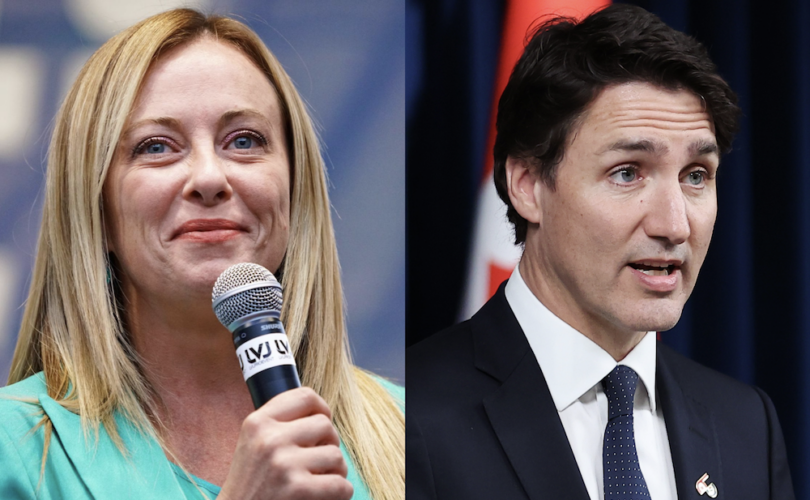By Jonathon Van Maren
Anyone who is listening to Hungarian prime minister Viktor Orban lately is probably getting the distinct feeling that he has been reading and re-reading Mark Steyn’s America Alone: The End of the World As We Know It. Over and over again, Orban is referencing the “Islamisation” of Europe, a term that if not invented by Steyn, was certainly popularized by him. “Dark clouds are gathering,” Orban has been warning in the leadup to Hungary’s April elections, and the Eastern European nation may well be the last bastion, the last holdout against a massive influx of foreigners into a continent that seems resigned to inevitable change.
In fact, Viktor Orban sounds very much like an angry populist—but a populist who actually recognizes what it is that Europe lost, in the first place. From The Guardian:
In his annual state of the nation speech, Orbán, who already appears set to win a third consecutive four-year term, made what are now familiar claims about his success in beating back threats to Hungary’s way of life from “Brussels, Berlin and Paris politicians”.
“We sent the muzzle back to Brussels and the leash back to the IMF,” he said early in his address on Sunday, praising the strength of the country’s economy.
The part of his speech which inevitably alighted on the threat of immigration will particularly concern Orbán’s many critics home and abroad. He claimed the west had “opened the way for the decline of Christian culture and … Islamic expansion” while his administration had “prevented the Islamic world from flooding us from the south”.
Deploying a host of questionable statistics and apocalyptic visions, Orbán said: “We are those who think that Europe’s last hope is Christianity … If hundreds of millions of young people are allowed to move north, there will be enormous pressure on Europe. If all this continues, in the big cities of Europe there will be a Muslim majority.”
He said immigration was no more helpful for a country’s national development than influenza contributed to a human body’s health.
This is tough stuff, but hardly surprising. The European Union has done nothing to alleviate the migrant crisis in Europe, and has instead made it worse, attempting to bully nations that wish to opt out of accepting enormous groups of migrants from other nations. This has not been taken kindly by many countries, especially those in Eastern Europe, where there is already a lot of resentment in the EU. When I was traveling in Serbia a couple of years ago, our tour guide decided to go off on a tangent rant against the EU, explaining that any assistance from that body came with massive pressure to abandon any traditional values and implement things like gay marriage. Needless to say, he was not impressed. More:
The rhetoric will strengthen the hand of those calling for Orbán’s rightwing populist party Fidesz to be ousted from the transnational European People’s party, of which Angela Merkel’s CDU is a member.
Orbán’s personal bete noire, the Hungarian-American financier and philanthropist George Soros, was also once again a target. He accused Soros of having used his fortune not only to buy influence in Brussels and the west, but also at the UN. Further unspecified measures were floated as a response, building on legislation designed to crack down on foreign-funded organisations.
There was a conspiracy to create a “Homo sorosensus, the Soros type of man” that must be a rejected, he said.
“Hungary is not a country of troubled people, we understand that György Soros’s men were already in the UN,” Orbán told his audience at the Várkert Bazár, a restored neo-Renaissance building on the Danube, outside which hundreds of people protested.
Orbán pledged his government’s solidarity with “those western European people and leaders who want to save their country and their Christian culture”.
“We are waiting for the Italian elections, where Silvio Berlusconi can again occupy the government positions.”
Gyula Molnár, the president of the socialist MSZP, said of the speech: “It was the product of a medium-sized enterprise manager with some fake illusions.”
Fidesz has the support of more than 40% of decided voters in a country where the media is largely pliant and the opposition divided.
Usually, I find that European leaders huff and puff on these issues while refusing to address the root causes of them. This is precisely why so many of the European identitarian movements popping up are so distasteful: They miss the point entirely. So often, migrants are blamed for “changing Europe” or “replacing Europeans” or “destroying the culture.” In reality, this is nonsense. The reason that European immigration rates have been spiking for decades—as Steyn, among others, have laid out in great detail—is that Europeans themselves have voluntarily decided (in most countries) to abandon the faith of their forefathers and to abandon childbearing. Immigrants have largely been brought in to replace the children Europeans decided not to have, or perhaps decided to dispense with through abortion.
Even in Poland the birthrate is below replacement rate, at 1.32 children per woman. Europe’s many rich cultures are dying, but by suicide—because parents are not having children, and those that do have children are not passing the old values and traditions on to their children. I remember a few years ago taking a river tour in Prague, gliding across the water past magnificent churches with spires thrusting upwards towards the heavens, while our tour guide explained that the Czech Republic was now an almost entirely secular country. The churches were empty. So were the cradles—the birth rate had dropped to 1.53 children per woman.
But Viktor Orban seems to be one of those rare European leaders who not only recognizes the problem and calls it out by name, but is actually willing to take concrete steps to address it. From the Hungarian Free Press last year on May 25, 2017:
Prime Minister Viktor Orbán announced on Thursday, at the World Congress of Families, held in Budapest, that his government intended to increase the birth rate from 1.5 children per woman to 2.1 by 2030. Hungary’s low birth rate and the decline in population has been a pressing problem for the country since the early nineties and new statistics show that the population has declined to just 9.8 million. At current levels, Hungary’s population will fall to 8.5 million by 2041. In Mr. Orbán’s mind, stopping the out-migration of young, working-age Hungarians or developing an immigration and integration policy is not the primary answer… The goal is to increase the number of child births by 30,000 per year by 2030. No government has been able to turn around demographic trends that have been present since 1980, when the country’s population peaked at 10.7 million. And in the world of demographics, 13 years is not a long time to so dramatically change a long-standing trend.
Orban has already put forward a concrete list of policies to cause population growth:
- Any female who owes a student debt will have her outstanding balance cut by 50% if she gives birth to 2 children. With 3 children or more, her entire student debt will be forgiven.
- Parents who give birth to 3 children will see the outstanding mortgage on their home decline by 1 million forints. Each additional child will result in a subsidy of 1 million forints per newborn, to be applied to the outstanding mortgage balance.
- The government will build and develop new nurseries and day care programs.
- Parents with at least two children can expect new tax benefits, although the prime minister did not reveal further details on this aspect of the action plan.
- The government will also establish a research institute to study demographics and ways to increase the country’s population.
It will be fascinating to see how Hungary’s attempts to reverse the demographic trend will play out. According to Orban, their calculation is simple: “Where there is space for two children, there is space for three, as well as for a fourth. The braver ones can accommodate five as well.” Orban, incidentally, has five children. Moreover, he continued, “The government has come to the simple truth that a little more support means a few more kids, while greater support means a greater number of children.”
The first elements of Orban’s pro-child platform—the forgiving of student debt—kick in this year. European nations that wish to seriously grapple with their demographic implosions should be watching Hungary very closely.








